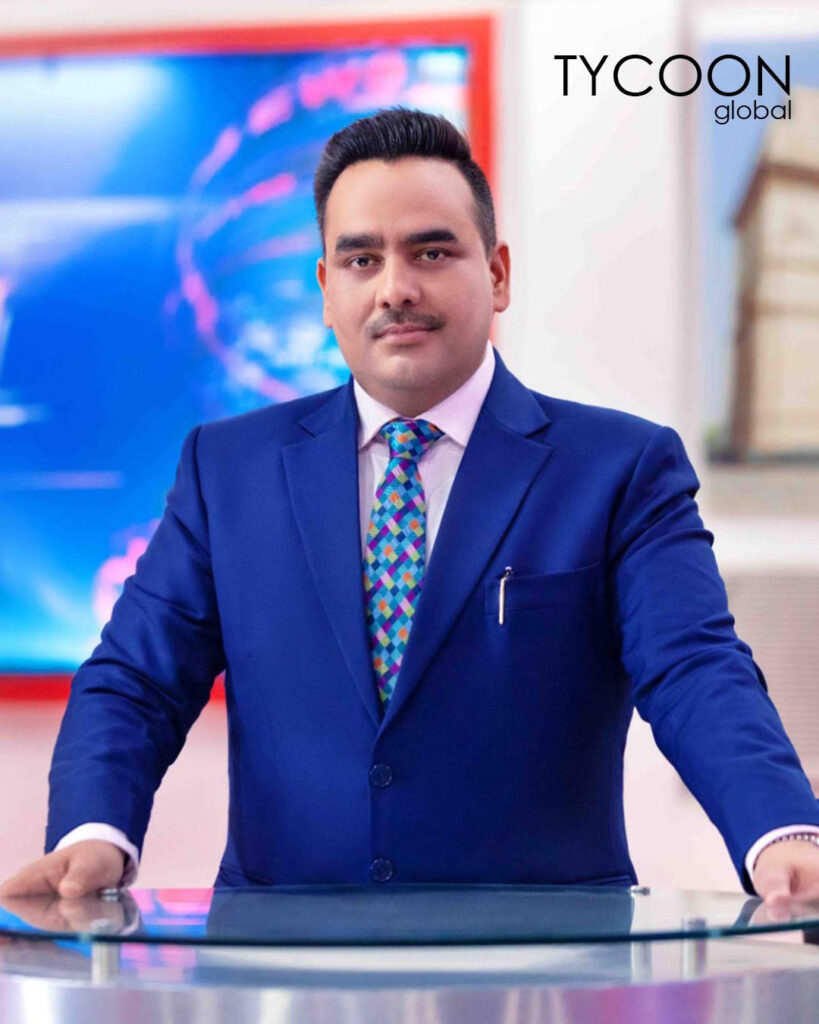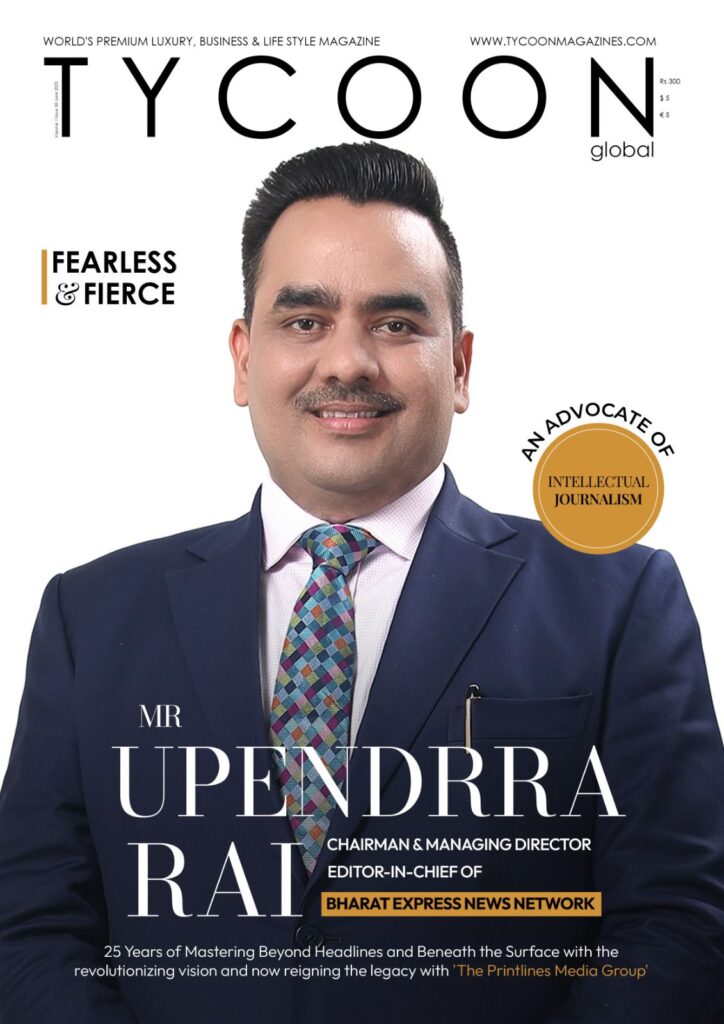Here’s an introduction of a media mogul with a persona doughed with courage, boldness, resilience, and determination.
This is about a renowned Indian journalist who is also a writer, thinker, motivator, and orator. As a media entrepreneur, he is making a difference in the neo-Indian media industry with an impactful endeavor through his media house, ‘The Printlines Media Group’, Mr. Upendrra Rai is Chairman & Managing Director, and Editor-in-Chief of media conglomerate ‘Bharat Express News Network’. Earlier he rendered his valuable services as CEO and Editor-in-Chief for Sahara India Media and Tehelka.


Witnessing the voyage as a vocal and fearless journalist, and facing manifold challenges on personal and professional fronts, Mr. Rai continues with a firm resolve to inspire and to contribute his life with determined efforts towards the pursuit of truth and transparency. Henceforth, he is a representation of his own integrity through his life devoted to his mission, deserving recognition for his accomplishments out of his endless journey of journalism.
Questions
1.) Can you tell us about your journey in the field of journalism and how you became the Chairman & Managing Director of Bharat Express News Network?
UR: I started my career as a journalist when I was pursuing my graduation long back in the late nineties. The inner desire turned into ambition and finally made me enter the field of journalism. Starting with Sahara as a Correspondent and later on as the Bureau Chief of Mumbai, I excelled onwards gradually. The opportunity in brands like Star News, Network 18, CNBC Awaz, Sahara News Network & Tehelka helped me garner experience and improve my journalistic skills. And with my efforts and the support of friends, I finally initiated my own venture with my own principles, ideals, and ambitions in the changing media market of today’s India. And yes, being honored by you is also another jubilating feather in my hat of achievements out of my journey so far. Thank you again.
2.) What motivated you to pursue a career in journalism, and what aspects of the profession do you find most fulfilling?
UR: To be honest, my inner voice has been inspiring me to discover the truth, motivating me to pursue a career in the field of challenges with responsibility as a journalist. Reporting, in accordance with my own notions, is the most fulfilling as well as most responsible aspect of the profession. If pursued with hardcore determination coupled with a clear intent to serve society, we truly can make a difference through reporting by honoring the fourth pillar of democracy for our compatriots. I yearn to make a significant impact in addressing the pressing challenges of the 21st century.
3.) What inspired you to establish Bharat Express News Network, and what is the vision behind this media organization?
UR: Bharat Express is the reflection of the visible existence of my long-cherished dream throughout my journey in journalism. My vision is crystal clear to me and my team from day one – More News and Less Noise! It is the sole guiding mantra for my media venture. Being interactive with our viewers and staying realistic about the subject is the second fundamental principle of the channel. Blindly following the TRP chase is not my cup of tea, my forte is to be concretely productive for the viewers with Satya (Truth), Saahas (Courage) & Sankalp (Determination) inch by inch in each and every step of my journey of journalism.
4.) Could you share any memorable experiences or stories from your time as CEO and Editor-in-Chief at Sahara Media?
UR: Winning the trust of Saharashri Subrat Roy Sahara, I had the opportunity of working as the CEO of the Sahara Samay Network and I rendered my services for the longest time (more than ten years) as the CEO there. Being the youngest News Director and CEO was also one of the proud feelings I cherished working there. Though there are several memorable experiences but beating all the then-national channels in business, was something I really cherish in my journalistic memory. Talking about the story, the Kedarnath calamity was the one that I am known to break for the track. Hence, there are many accolades and now I am delighted reminiscing about my old days with the feel of encouragement and multiplied energy for doing far better through my media endeavor.
5.) Can you tell us about a significant story or investigation that you led, which had a positive impact on society or brought about important changes?
UR: There are several such stories to name. Nevertheless, my path-breaking stories related to Taxation, Business, Politics, and Entertainment during my tenure at Star News (renamed ABP News) in the year 2006 were the ones that are very close to my heart. For instance, I unearthed the DMAT account scandal in October 2005. Likewise, I broke the story of stud farm owner Hasan Ali in January 2007 which resulted in government agencies’ action against Ali. Going by memory lane, such stories are a source of my dealing. And the reason is obvious since they had a positive impact on society. And the admiration and appreciation I garnered then was the moral booster for my confidence in encountering challenges every inch.
6.) You have been recognized for your investigative journalism work. Can you talk about any notable investigations you have conducted and the impact they have had?
UR: This is within me, let me tell you. Investigative journalism is the branch of journalism that is a must for all countries in their democratic setup. In fact, it is the need of the hour and the basic responsibility of media houses to encounter corruption and that would always require investigative journalists for that very purpose. Leaving Sahara News Network in 2016 when I commenced my next inning in Tehelka as CEO and Editor-In-Chief, I had the opportunity to indulge in the hardcore world of investigative journalism with the topmost investigative journalism brand. Before getting back to Sahara News Network again as its Senior Advisor in September 2019, I was too preoccupied with such stories almost on a daily basis. And yes, I got to learn a lot from that experience, and I have a Special Investigative Team (SIT) now in Bharat Express for this purpose only. The show must go on, I believe.
7.) Apart from your work in journalism, you are also a writer. Can you tell us about the books or articles you have authored and their significance?
UR: I am delighted to share that two of my books, namely Nazariya, and Hastakshep have been popular not only among people belonging to the field of journalism, but have also accumulated an abundance of appreciation from the intellectual readers hailing from non-journalistic fields. Though the books represent a collection of articles on diverse subjects ranging from politics, economy, sports, culture, and social issues of India, in fact, as a chronicle of India’s political, economic, social as well as cultural journey over the past two-and-a-half decades, the two books of mine are a representation of my deep innovative thoughts.
Some of my other books are in the process of publishing and will soon be available in the market. I am also working on a few books since writing is a habit of mine that quenches the thirst of my being. As far as my books or my articles are concerned, they are the straight expression of my thoughts. And let me be more straight here, I am a person who is not scared of coming out with the truth, no matter what!
8.) What advice would you give to aspiring journalists who are just starting their careers in today’s competitive media landscape?
UR: I am proud of being a straightforward person with no fear of coming out with the truth. To be honest, my advice to all aspiring journalists is that if you don’t have courage, you better stay away from journalism. This field expects firm resolve from you with the strength of determination and devotion towards chasing your goal of the honest and purest form of journalism – no matter where you are and who you are! If you are a journalist, you are on a mission!

